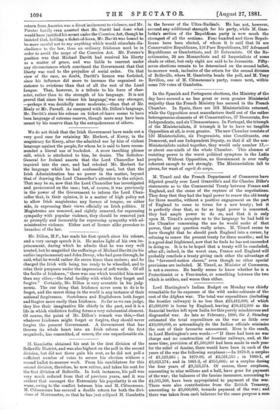Mr. Dillon, M.P., has made his first speech since his
release, and a very savage speech it is. He makes light of his own im- prisonment, during which he admits that he was very well treated, but he magnified the sufferings of Michael Davitt (in his earlier imprisonment) and John Devoy, who had gone through, he said, what he would rather die seven times than endure ; and he charged the Irish with being too ready to be wheedled, and to relax their purposes ender the impression of soft words. Of all the faults of Irishmen, " there was one which troubled him more than any other,—the fatal facility with which they forget and forgive." Certainly, Mr. Dillon is very eccentric in his judg- ments. The one thing that Irishmen never seem to do is to forget, and the rarest thing in the world is any instance of their national forgiveness. Scotchmen and Englishmen both forget and forgive more easily than Irishmen. So far as we can judge, they live their imaginative life chiefly in the past, and it is a life in which vindictive feeling forms a very substantial element. Of course, the point of Mr. Dillon's remark was this,—that whatever Irishmen might forget or forgive, they should never forgive the present Government. A Government that has thrown its whole heart into an Irish reform of the first magnitude, has committed, of course, the one unpardonable sin.






























 Previous page
Previous page